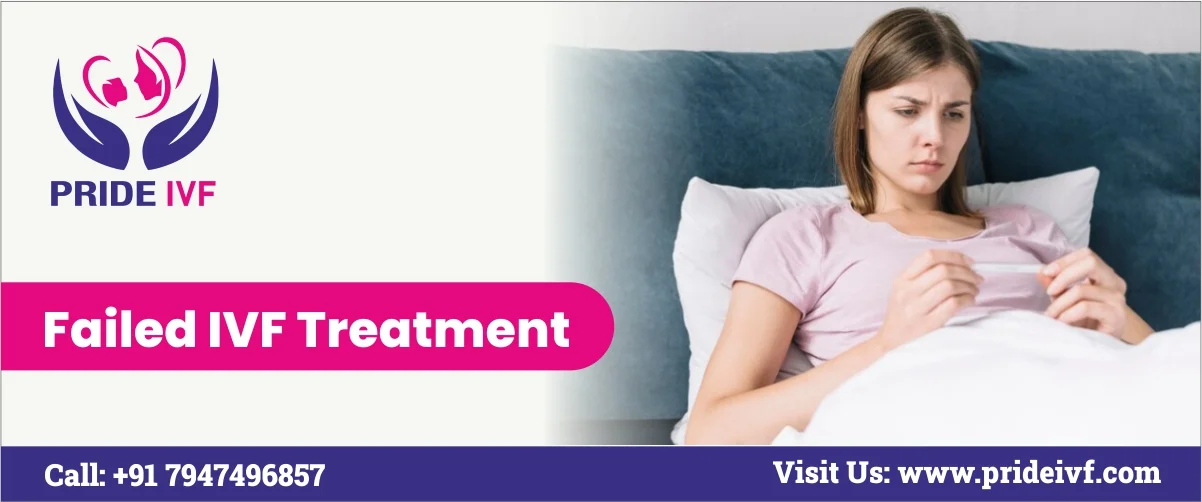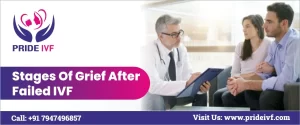Failed IVF Treatment: IVF is one of the most emotionally charged events in the field of family planning. Many see it as an opportunity to fulfill their ambitions of becoming parents and as a source of hope. But sometimes the road is not easy, and some couples experience the heartache of an unsuccessful IVF procedure, why ivf fails. This blog examines both the practical and emotional facets of this experience, offering guidance on overcoming setbacks and moving on.




The Psychological Repercussions of an Failed IVF
An IVF cycle that fails might leave one feeling deeply disappointed. In the process, many couples not only invest their money but also their aspirations and ambitions. Feelings of loss, rage, and loneliness might arise when the result is not what was anticipated. (Read: Depression After Failed IVF)
Grief and sadness: It’s normal to experience sadness. You can be grieving for the future you imagined as well as the possible kid. Similar to other types of loss, this emotional toll may require time for processing and recovery. (Read: Stages of Grief After Failed IVF)
Guilt and Blame: A lot of people second-guess their choices and may experience guilt or blame. It’s essential to keep in mind that nobody can always regulate the intricacies of reproductive treatment.
Isolation: pursuing IVF may be a lonely experience. Since friends and relatives might not really get what you’re going through, it is essential to find others who can connect.
There are numerous causes which can result in IVF failure. Understanding the many reasons might aid couples in managing their difficulties and looking forward to work on them. To name few of the reasons for IVF failure includes:
- An embryo’s growth and health (Read: Why Does IVF Fail with Good Embryo)
- Age of the Egg
- Uterine Environment
- Quality of the Sperm
- Endometrial Health
- Polyps or Fibroids
- Imbalances in Hormones
- Underlying health Issues like PCOS, endometriosis. thyroid Conditions
- Genetic defects in embryos can result in an early pregnancy loss or prevent an embryo from implanting successfully.
- Procedure technique and timing
- Lifestyle Factors such as smoking, binge drinking, and eating poorly
- Stress
After a failed IVF treatment one should give themselves a substantial amount of time to heal as your physical and mental state both need time to recover. Your body may change after a failed cycle; these changes might differ from person to person.
Physical Changes After Failed IVF
- Hormonal medications used in in vitro fertilization (IVF) may cause mood, weight, and energy swings. It could take some time for your body to rebalance after a failed cycle. (Read: What Happens To Your Body After Failed IVF? )
- When you stop taking medication, it may take some time for your menstrual cycle to return to normal. Periods that are heavier or lighter than normal might occur. (Read: When to Expect Period After Failed IVF?)
- Ovarian stimulation might cause pain or bloating in certain women.
- Fatigue can result from the psychological and physical effects of in vitro fertilization, even in the absence of active therapy.
- Sometimes, weight gain or reduction is transient as a result of hormone therapies.
It’s important to give yourself some time to think after an unsuccessful IVF procedure and weigh your alternatives going forward.
Failed IVF Treatment Alternatives
- Speak with Your Expert: Make a follow-up appointment with your fertility doctor so you can talk about the issues that arose and whether or not to try again in the future. Knowing the medical aspects might help you make sense of things and plan your next course of action.
- Investigate Other Options: Depending on your situation, you might want to think about the following other routes to parenthood:
- Try again: A lot of couples decide to try again with IVF. Talk about any modifications to the drug or treatment plan that might improve your odds of success.
- Donor Sperm or Eggs: Utilizing donor sperm or eggs might occasionally result in a healthy pregnancy.
- Assessing surrogacy and adoption as satisfying alternatives to biological parenting may be possible.
Making the decision to attempt another IVF cycle can be a big step, particularly following an unsuccessful attempt.
Things To Consider Before Failed IVF Treatment
- Talk over everything in detail with your fertility specialist. Examine the successes and failures. They can provide information about how to modify your treatment plan, such as adding further tests or changing your medication.
- Make sure your health is excellent. Put an emphasis on stress management, a healthy diet, and frequent exercise. Certain clinics can suggest modifying your lifestyle to improve your chances.
- Think about joining a support group or therapy. IVF can have a substantial emotional cost, thus it can be highly beneficial to have a support system.
- Become familiar with the expectations for this cycle. This entails being aware of the timetable, monitoring schedules, and drug guidelines.
It might be difficult to navigate the consequences that result from an unsuccessful IVF round, but help is available.
Also Read: 3 Failed IVF Cycles? What Next?
Additional Help After Failed IVF
- Counseling and therapy: Having a conversation with a therapist who focuses on reproductive concerns can offer a secure setting for processing feelings and creating coping mechanisms.
- Support Groups: Making connections with people who have experienced comparable things can help to create a feeling of understanding and community. Many people find comfort in confiding their experiences and emotions to those who genuinely get them.
- Open Communication: It’s critical to keep the lines of communication open with your spouse. Express your emotions, worries, and hopes. This deepens your relationship and offers consolation to one another in trying times.
Lets get started
Important Things To Consider Before Choosing an IVF Facility
- Seek out clinics with a strong track record of IVF patients, taking into account your diagnosis and age.
- Examine the reputation of the clinic by reading reviews, testimonies, and patient referrals.
- Take into consideration fertility clinics that specialize in your particular problems. Some could be specialists in diseases like endometriosis, PCOS, or infertility that doesn’t make sense.
- Review the variety of available treatment choices. Certain clinics could benefit you with their cutting-edge technologies or unconventional methods.
- Learn about the associated costs, which may include prescription drugs, consultation fees, and other possible out-of-pocket charges.
Even though the process could seem overwhelming, many couples who had an unsuccessful IVF round discover newfound optimism. Recall that your fertility journey does not determine your value. Honor little accomplishments, such as emotional development, better relationship communication, or simply simple happy moments in daily life.
We at Pride IVF Clinic acknowledge that being a parent can be difficult. To help you realize your goals, our devoted team of fertility specialists is committed to offering individualized care, cutting-edge therapies, and emotional support.
We begin by doing a comprehensive assessment to comprehend your particular circumstance. In order to develop a customized treatment plan, we do thorough fertility screenings that include blood tests, ultrasounds, and thorough medical histories.
To ensure the greatest levels of care and safety, our clinic is staffed by highly qualified professionals and outfitted with the newest reproductive technology. In order to support you in making wise decisions, we openly share our data and work tirelessly to enhance both our Techniques and results.Every Journey and every individual is different. Our caring staff is committed to your individualized service that is catered to your requirements, situation and preference.
Ready to take the next step? For a consultation, get in touch with us right now. Our staff is available to assist you with the process and to respond to your inquiries.
Conclusion
It is undeniably difficult and emotional to undergo an unsuccessful IVF therapy. But it’s also a chance for development, introspection, and interpersonal relationships. You may travel through this path with resilience and hope if you prioritize self-care, look for solutions, and ask for help when you need it. Recall that there are several ways to create the family of your dreams and that you are not alone.
FAQs
What does it mean if my IVF cycle fails?
An unsuccessful IVF cycle indicates that either the embryos failed to implant in the uterus or the pregnancy did not progress. Numerous factors, including hormones, uterine circumstances, or the quality of the embryo, may contribute to this.
How often do IVF cycles result in failure?
Regretfully, unsuccessful IVF rounds occur often. Success rates are influenced by a variety of factors, such as age, health, and embryo quality.
How long should I wait before trying IVF again?
Depending on the specifics of each case, the waiting period may change. After one cycle, some might feel ready to try again, while others might need to take a hiatus in order to heal physically or emotionally.
How can I increase my chances of getting into the following cycle?
Think about adopting healthier lifestyle practices including stress reduction, frequent exercise, and a balanced diet. Your chances of success might also be improved by carefully collaborating with your fertility doctor to resolve any difficulties found.




